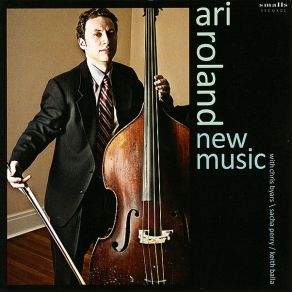New Music
Download links and information about New Music by Ari Roland. This album was released in 2009 and it belongs to Jazz, Contemporary Jazz genres. It contains 7 tracks with total duration of 45:27 minutes.

|
|
|---|---|
| Artist: | Ari Roland |
| Release date: | 2009 |
| Genre: | Jazz, Contemporary Jazz |
| Tracks: | 7 |
| Duration: | 45:27 |
| Buy it NOW at: | |
| Buy on iTunes $6.93 | |
Tracks
[Edit]| No. | Title | Length |
|---|---|---|
| 1. | Damonesco | 5:38 |
| 2. | Village | 6:26 |
| 3. | The Finder of Horsehair | 6:46 |
| 4. | Station Blues | 7:39 |
| 5. | Portrait of M. | 6:41 |
| 6. | Story of Three | 6:40 |
| 7. | Folk Melody | 5:37 |
Details
[Edit]Fond of straight-ahead neo-bop themes and forward motion, acoustic upright bassist Ari Roland presents a focused and somewhat idiomatic but original kind of jazz that makes one ponder and concentrate a bit harder than if he and his group were playing predictable jazz standards. The nature of his music on this, his third album, sports parameters based in predecessors of the modern mainstream. But there's an edge to it that smells of spicy brown mustard, due to the unusual sound produced by tenor and alto saxophonist Chris Byars. Where lines are blurred and snaky trails are traceable, it is the elusive nature of Byars that compels you to listen closer, lest you miss a significant event. There's a harmonic kinship to Lee Konitz, Jimmy Giuffre, or the music of Andrew Hill that can be identified in the persona of Byars, but it could not ever be mistaken for the sharper tones of Jackie McLean or the rough-and-tumble fleetness of Phil Woods. With the excellent pianist Sacha Perry and reliable drummer Keith Balla, the Roland quartet proves to be a formidable four-piece searching for new swing-based territory to explore. The first three tracks of the recording hold course in a steady tempo, whether in a lyrical post-bop mood during "Damonesco," the angular Thelonious Monk-flavored "Village," or the strained forms and uncommon constructions Byars employs on "The Finder of Horsehair." For the melody in "Story of Three," the pace is the same, but the ongoing improvisational language Byars conjugates is impressive and Zen-like, even more off-minor as "Portrait of M." unfolds. A stark individualist, it would be tough to compare Byars with other younger players of his generation, but he's also able to fathom a looser, liquid feeling within a bop framework, as you hear on the faster "Folk Melody," and yes, he is capable of tender moments as rendered for the patient "Station Blues." While this is Roland's date, the strong, inexhaustible, and heady thinking man's sax of Byars is the focal point, commanding attention away from the others. Roland did compose these selections in total, and considering that all of the group's members save Balla have been performing regularly for over two decades since they were kids, there's a shared vision that comes across clearly. Where the dominant voice of the saxophone plays a big part in how this recording is heard, it also shows that the bassist is happy via this association with his bandmates, and has no problem relegating the spotlight, even if underneath it all, this is truly his music. ~ Michael G. Nastos, Rovi